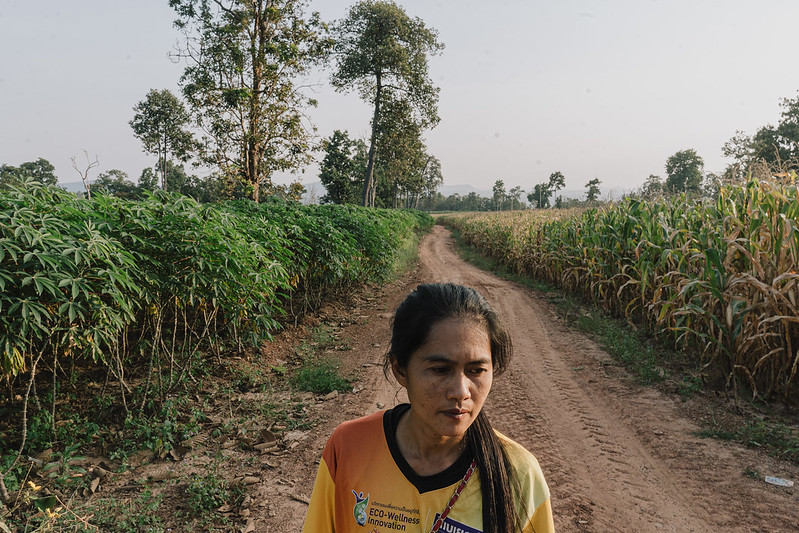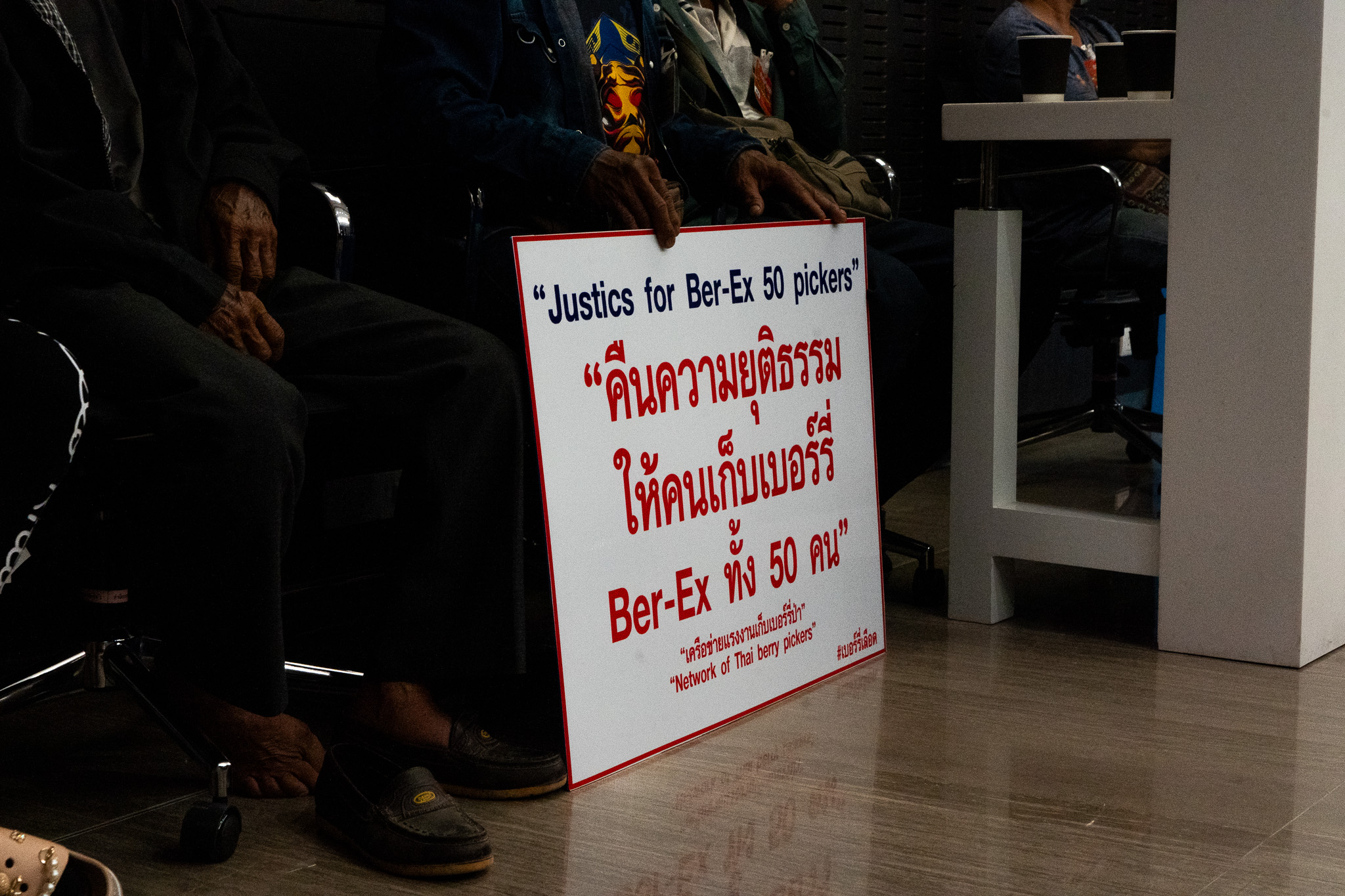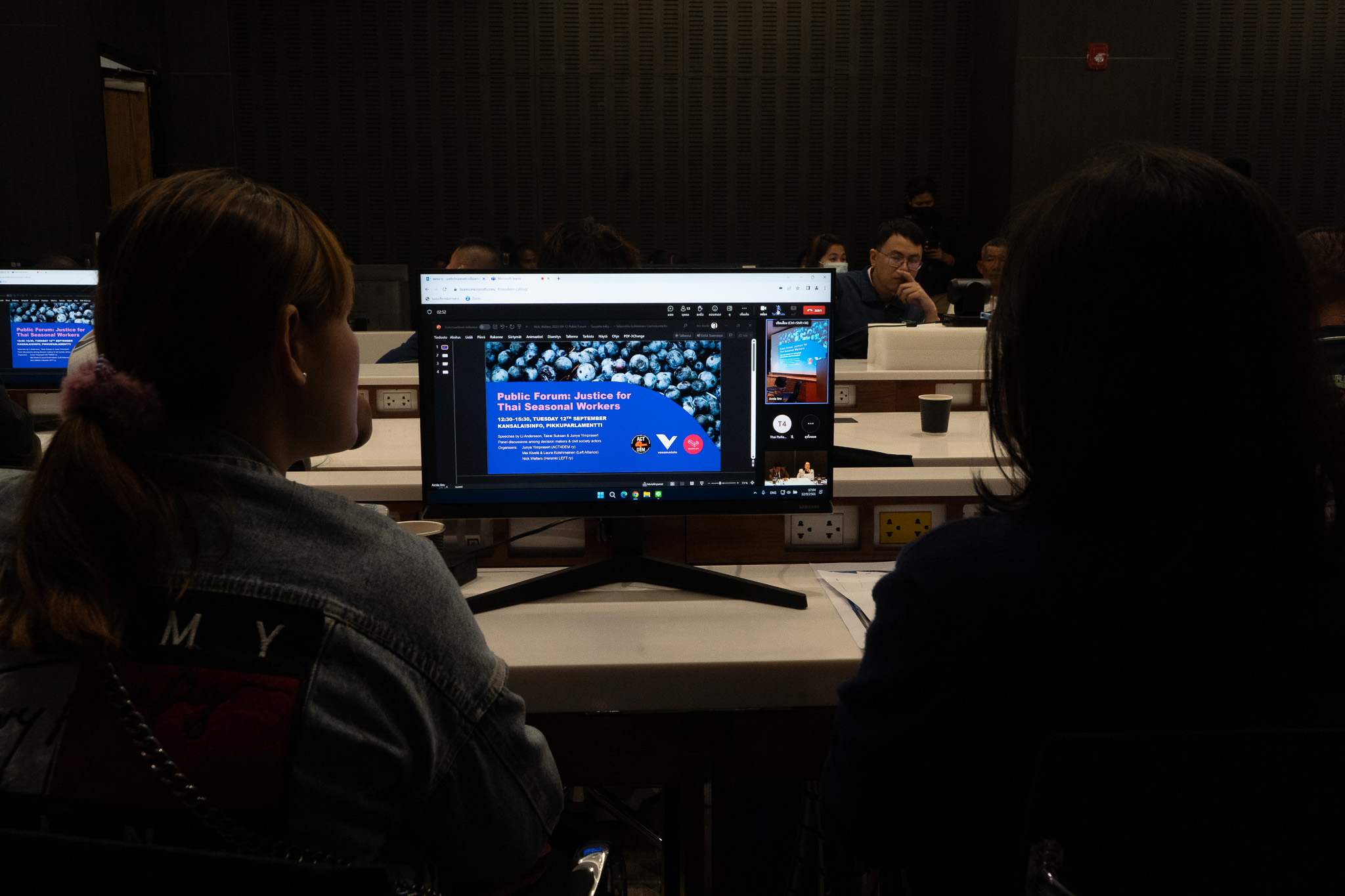The effects of climate change are touching the lives of countless people around the world. Predictably, those already vulnerable are suffering even more. In the Northeast, there are 87,000 people living with disabilities. The meager stipend the government provides is not nearly enough to cover expenses. In this special feature from Teerayut Weerakam, the story of a mother and her severely disabled son in Nakhon Phanom shows the challenges they face.
Twelve years ago, Patcharee Insee suddenly found herself having to take on the role of a caretaker for her son. At the age of eight months, Natthawut Insee became bedridden after suffering seizures caused by meningitis. Ever since, Patcharee has devoted her time to care of her son, now 13, who has irreversible brain damage.
Patcharee, a rice farmer, receives a monthly government stipend of 1,000 baht for people with disabilities. That amount can barely cover expenses occurring from taking care of her sick son. Worse, climate change is now affecting the income she gets from her crops as well.
Patcharee Insee helping her bedridden son take his medication in their home in Nakhon Phanom province
Heavy rains and damaged crops
At the beginning of the harvest season, after feeding her son and giving him medications to prevent seizures, Patcharee takes the 10-minute trip down a dirt road on her motorbike to her rice field. That motorbike is one of the few, last valuable possessions of the family, earned by her husband who spent more than five years as a laborer in Libya.
At her paddy, the ears of rice are starting to grow.
“First I get seeds for planting next year. I should be able to harvest everything next Saturday. I’m waiting for the harvester,” she says before getting into the paddy. “This year isn’t great. A lot of rice was damaged. There has been too much rain and flooding.”
At the beginning of August last year, Nakhon Phanom saw heavy downpours for several consecutive weeks. The rainfall was so heavy that the water couldn’t be drained out to the canals connecting to the Mekong River in time. The river itself also saw a critically high level of water. The rains and floods submerged over 40,000 rai of agricultural land. The entire province was declared a disaster area by the provincial governor.
Although most of the fields in Patcharee’s village, situated on higher land, were spared from the floods, the roads to the village and its surrounding areas were inundated and made it impossible to travel.
Medication delivery halted
The floods came as Patcharee’s son was running out of his medication.
Patcharee had signed Natthawut up for a health initiative, initiated after the COVID-19 pandemic, that relieves the burden of families having to pick up medicine from the hospital and instead having them delivered to the patient’s door. This year’s flooding, though, inevitably impacted this delivery service.
It is of grave concern to Patcharee: simply said, her son cannot live without his medicine.
As there is no pediatric neurologist in Nakhon Phanom, Patcharee says she has to make the many-hours-long journey to take Natthawut to see a doctor in Khon Kaen province.
“If we have an appointment on Tuesday, we have to start traveling on Monday,” she says of the routine to make a visit to the doctor. ‘It takes about five to six hours to travel there. Then we have to rent a room for 350 baht a night. Then we go to the hospital on Tuesday morning. After seeing the doctor, we take the journey back home.”
Now, the doctor only schedules an appointment every six months and has the medication delivered to them by mail every month. Patcharee doesn’t need to take her son on the long road trip to get his treatment as often as she used to.
“This medicine is vital. If he stops taking it, he’ll have seizures. If he has them too often, his brain becomes more damaged,” she says. “I thought about moving him to a hospital in Nakhon Phanom, but the doctor said we wouldn’t be able to get the same medicine her son currently takes. Smaller hospitals don’t have the particular one he needs. I’m worried that if a different medicine is not as effective in preventing his seizures, I won’t be able to go out and work on the farm, and then I won’t have any money. So, I decided to continue his treatment in Khon Kaen.”
A paltry stipend for people with disabilities
Although the government provides a monthly stipend for people with disabilities, the amount of 800 to 1,000 baht isn’t nearly enough for the costs that come with treatments that they need, says Pathomporn Panlakpon, the president of the Association for Intellectually Disabled People of Nakhon Phanom.
“Take Patcharee as an example: the doctor used to schedule appointments often. She had to spend money on transportation and overnight accommodations. She is perseverant and tries to take things into her own hands,” she says. “If there was healthcare that was easily accessible and gave universal coverage, that would be good.”
In the afternoon, Patcharee rushes back home from the rice fields on her motorbike to bathe her son and cool him down from the sweltering heat.
After the bath, Natthawut is clearly having difficulty breathing due to asthma. Patcharee says that temperatures too hot or too cold can trigger symptoms. Because of his weak immune system, Natthawut is vulnerable to extreme weather conditions, she says.
According to the report, “Impact Assessment of Climate Change and Environmental Degradation on Children in Thailand,” the northeastern and southern parts of Thailand are most at risk of impact from climate change, especially vulnerable groups of children with weak immune systems, or those who are intellectually disadvantaged and need to rely on their caretakers.
The report also found that children and their families who live in secure environments, with adequate income and access to clean water, will be able to adapt to climate change better than poorer families that live in rural areas.
“I’m his mom,” Patcharee says. “I made him, so I want to do my best to take care of him. I shouldn’t abandon him. I used to think that it would be better if he dies before I do, because if I die first, then who will take care of him?” she asks, with a hint of exhaustion in her voice.
“I’m not ashamed of him. Whatever condition he’s in, I’m never ashamed of him. Some people give me money. Some people take pity on me. I don’t want it.”
“I’m not a beggar. I just want the government to create jobs for caretakers or provide better welfare for my son.”
Natthawut Insee taking his medication through a nebulizer
Patcharee fills the medication into a nebulizer before putting the mask over her son’s nose and mouth. The boy wails as the machine roars in the background, out of pain that he’s unable to describe with words. Although the nebulizer finishes after 10 minutes, Natthawut doesn’t stop crying.
Pathomporn, the head of an association for disabled persons, is convinced that climate plays a role in the woes of the disabled. “Climate change definitely has an impact on emotions and health, especially for children with disabilities, most of whom have weak immune systems,” she says.
‘It’s difficult enough for a normal kid to adapt. It’s impossible for a bedridden child to survive. If they can still help themselves to some extent, there ought to be workshops to help them adapt in this particular circumstance. If they cannot help themselves at all, they need a caretaker.”
“There are more than 87,000 people with disabilities in Isaan, the biggest number in the country, but I haven’t seen any agency taking a serious action on this issue,” she says.
According to a Unicef Thailand report, the Thai government has recognized the necessity to prepare for climate change, as noted in the country’s 20-year national strategy plan and several other national policies. However, those measures lack plans to mediate risks of climate change in the Northeast. They also fail to address the impacts on vulnerable groups of children, which is a significant issue that shouldn’t be overlooked by the government.
Patcharee carries her skinny, underweight boy, gently puts him down on a mattress, and pulls down a mosquito net. As the sun is setting, the tiny lightbulb under their small wooden house is lit up. The temperature starts to cool down as night falls.
Perhaps tonight, Patcharee will be dreaming for her son to be able to walk and play like the other kids of his age.





